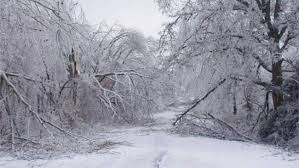R. Boon
December 25, 2013
Until
the Landscape Rang
He slid and spiraled down
the road, drinking, gliding on the ice, amused at his every near-fall, inviting
the moon to laugh along with him. The
ice storm had danced through all afternoon, coating trees and grasses and fence
posts and phone lines. No one was out
driving. Near the bottom of the hill, he
came across an enormous yellow road-grader, there waiting for the snow that was
expected to follow. He up-ended the
bottle of cheap red wine and tossed it behind him. He stood, unsteady on the glassy surface. He held up one wavering finger in front of
him, picked the spot and touched the road-grader’s engine. It came to life with a dinosaur’s bellow and
then lurched forward, buckling the pavement across both lanes, then sputtered
to a stop. He fished around in his
pocket and pulled out an impossible length of bent rebar, and used the thick iron
to puncture crankcase and tires. He
spread his arms, sliding backward, and yelled to the moon, “Edward Abbey would
be proud!” He trailed a finger along the
road-grader’s proud yellow paint, and crumbling patches of rust appeared.
Humming, he stepped off
into the fields. “Revealed complexity,”
he laughed, looking at the ice that coated what would usually not be seen. He spotted a bottle tossed out by the
Franklin boys, a bottle stolen from the Buy-and-Drive Package store. He shook the bottle, drank, and felt the
whiskey fire down his throat. He sang “You
know that it would be untrue / You know that I would be a liar, / If I was to
say to you…,” then pulled at the whiskey again.
He wandered through the fields, touching stem
and branch, alive in the moonlight, stepped along without breaking any of the
ice. The alcohol pulsed inside him. He emptied the whiskey, and spoke to the
bottle, “just a wee sup more,” in a put-on-Irish accent, “a wee drop,” and the
bottle complied, refilling a third. He
drained it. “But na’more, I suppose,”
and tossed the bottle far out into the field.
“Girl, we couldn't get much higher,” he sang, then added, “what
bullshit.”
He stood for a moment,
listening to the near-mute water. “Brother Creek,” he called out to the glassy
trickle, gravity-pulled, moving north to south.
He began to race along the creek edge, looking for another bottle,
dropping his human shape, moving into the ice, racing along, a fluid moving
against gravity, inside all the tubes of ice coating stems and trees and
grasses, became himself a spreading field of moonlight, breaking tubes and icy
jackets as he burst from one to another.
The whole field began to ring with the shattering.
He found an empty
brandy bottle. He flowed back into a
human shape, picked up the bottle, coaxed it to fill. He downed half of it in one long pull, and stood
reciting a poem he liked:
“Well, Mr.
Flood, we have not met like this
In a long time;
and many a change has come
To both of us, I
fear, since last it was
We had a drop
together. Welcome home!”
Convivially
returning with himself,
Again he raised
the jug up to the light;
And with an
acquiescent quaver said:
“Well, Mr.
Flood, if you insist, I might.”
He drank, then fumbled with his trousers, taking a long
piss across the weeds. Ice broke, and
with a wave of his hand, pigweed, knotgrass, thistle, purslane and wild mustard
blossomed, scattered, took hold, and would not soon leave this farmer’s field. He recited again,
For soon amid the
silver loneliness
Of night he lifted up
his voice and sang,
Secure, with only two
moons listening,
Until the whole
harmonious landscape rang—
He stopped the poem, drank. A mile away, he heard the high-pitched
chorus, the yips and yowls. “Ah, my
little gray cousins!” He finished his
brandy and sang, loud, off-key, in a gathering howl, “The time to hesitate is
through, / No time to wallow in the mire”—he paused, laughing, “but I like the
mire, too,” and sang again, “Come on baby, light my fire, / Try to set the night
on fire/ Try to set the night on fire.”
He shifted form again. “Wait for
me,” sang Coyote, bounding through the ice.
© 2013, Robert E. Boon


No comments:
Post a Comment